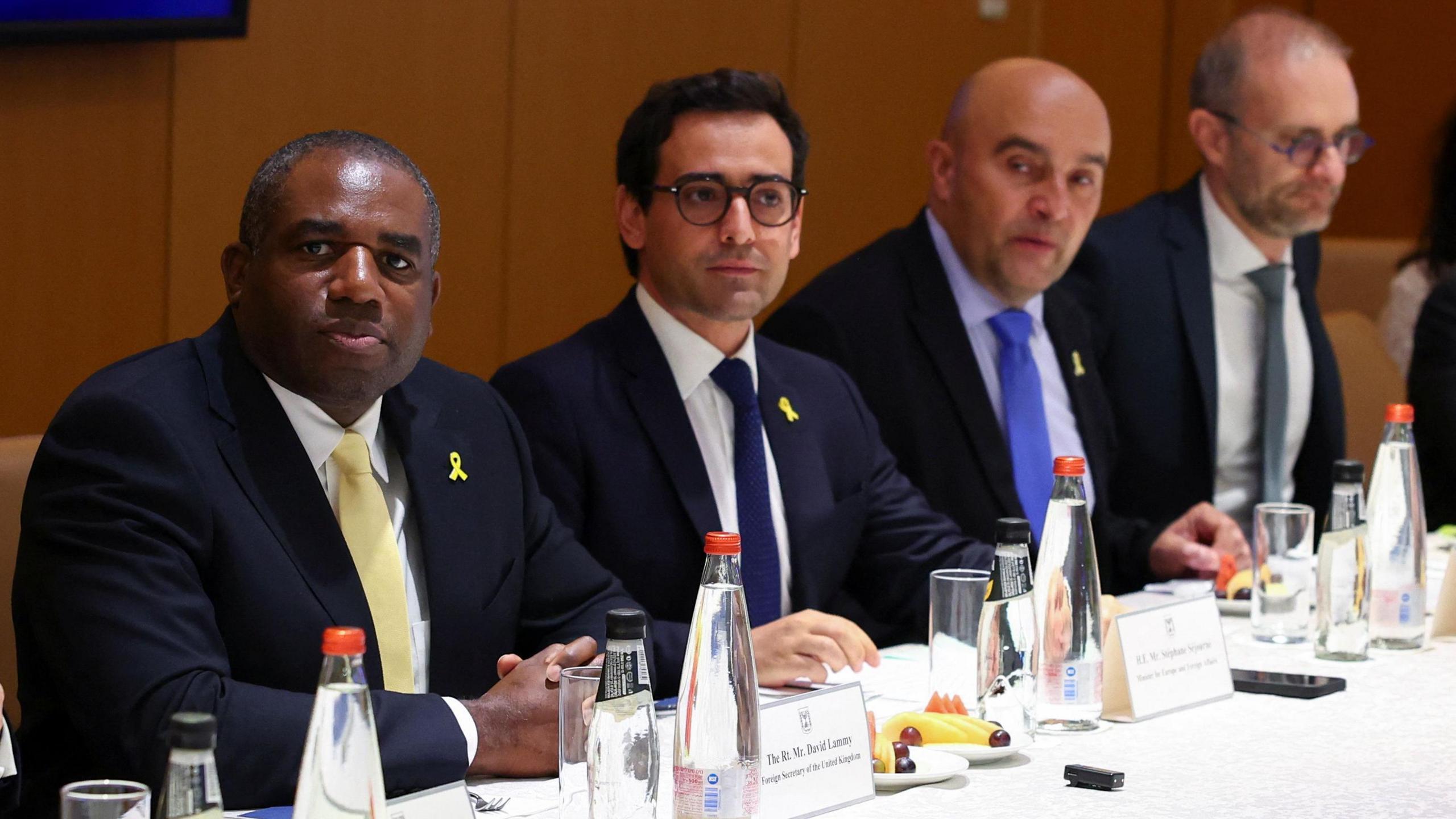Time for Gaza ceasefire deal is now, says Lammy

French Foreign Minister Stephane Sejourne (centre) joined David Lammy in Israel
- Published
The time for a Gaza ceasefire deal is "now", Foreign Secretary David Lammy has said on a visit to Israel with his French counterpart Stéphane Séjourné.
In the first joint UK-France visit in more than 10 years, the pair met Israeli Foreign Minister Israel Katz and Minister of Strategic Affairs of Israel Ron Dermer, as well as visiting the Occupied Palestinian Territories.
It comes as a fresh round of ceasefire talks have begun in Doha, with negotiators from the US, Qatar and Egypt meeting an Israeli delegation.
There are fears of an all-out regional war involving Iran following the killing of Hamas leader Ismail Haniyeh in Tehran last month.
Western countries have been urging Iran to refrain from retaliating against Israel, which has neither confirmed nor denied involvement in the assassination.
The Iran-backed Hezbollah movement in Lebanon is also threatening to retaliate over Israel’s killing of one of its top commanders in an air strike in Beirut.
Risk of regional war hangs over Gaza ceasefire talks
- Published15 August 2024
Lebanese hold their breath as mediators scramble to avert all-out war
- Published14 August 2024
It is hoped that a new ceasefire deal in Gaza and the release of Israeli hostages would calm tensions in the region.
Speaking to reporters, Mr Lammy said Israeli ministers had told him "they hope we are on the cusp of a deal".
He added: "The time for a deal for those hostages to be returned, for aid to get in in the quantities that are necessary in Gaza, and for the fighting to stop, is now."
The US said there had been a "promising start" to talks but "there remains a lot of work to do".
Hamas has said it will not participate in the negotiations for now, although mediators are said to be relaying messages to the armed group’s officials based there.
The group - which is proscribed as a terrorist organisation by Israel, the UK and other countries - has claimed Israel has added new conditions to a previous proposal that had US and international support.
Earlier Mr Lammy warned of a "dangerous moment for the Middle East".
"The risk of the situation spiralling out of control is rising. Any Iranian attack would have devastating consequences for the region," he said.
French Foreign Minister Stéphane Séjourné said: "It's never too late for peace.
"We must at all costs avoid a regional war, which would have terrible consequences. We must secure a ceasefire agreement and the release of the all the hostages."
Cars and homes torched in West Bank village overnight
Mr Lammy also responded to events in the occupied West Bank overnight, where a Palestinian man was shot dead as dozens of Israeli settlers attacked a village.
"The scenes overnight of the burning and torching of buildings, of the Molotov cocktails thrown at cars, of the widespread rampage and chasing of people from their homes is abhorrent and I condemn it in the strongest of terms," he said.
Israeli Prime Minister Benjamin Netanyahu's office said he took the riots "seriously" and promised those responsible for any criminal acts would be "caught and prosecuted".
Mr Lammy said he hoped the swift investigation promised by Mr Netanyahu would ensure those responsible would be brought to justice.
It is the latest in the series of attacks by extremist settlers on Palestinian villages in the West Bank, where there has been a spike in violence since Hamas’s deadly attack on Israel on 7 October and the ensuing war in Gaza.
The Israeli military launched a campaign in Gaza to destroy Hamas in response to the unprecedented attack on southern Israel on 7 October, during which about 1,200 people were killed and 251 others were taken hostage.
Gaza’s Hamas-run health ministry said on Thursday that at least 40,005 people had been killed in the territory since then.
The figure, which does not make a distinction between combatants and civilians, is often disputed by the Israeli government but is broadly accepted by UN agencies.